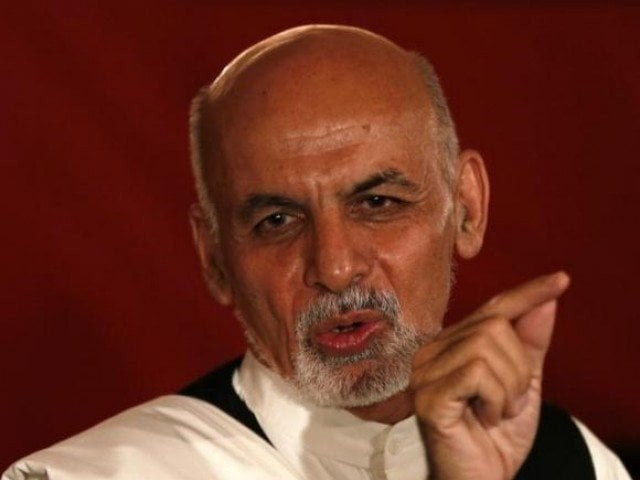Regional proxies or inside job? Kandahar attack reveals intricacies of Afghan conflict
UAE will take lead in investigating murder of its citizens and the probe will be consequential for Pakistan

Afghan President Ashraf Ghani. PHOTO: REUTERS
Never has an Arab dignitary been attacked by militias in Afghanistan. Taliban, which maintain a political office in Qatar, have denied responsibility for the Kandahar attack. The elusive militant bloc, however, did own the bloody acts carried out the very same day in Kabul and Helmand.
Rejoinder from Islamabad: Foreign Office deplores Kabul’s ‘rhetoric’
Predictably, Afghan President Ashraf Ghani blamed Pakistan for not taking responsibility for its territory which he claims is used by anti-Afghanistan elements. Otherwise marred with bitter infighting on almost every national issue, the Afghan government has unanimity of view against Islamabad. The Afghan leader reportedly told Pakistan Army Chief General Qamar Javed Bajwa that the perpetrators of the terror attacks “lived, were recruited and operated freely in Pakistan and no action was taken against them”. If the Afghan side did speak to the Pakistani military chief in such firm and blunt terms, then what was the harm in releasing the transcript of entire telephonic conversation?
Afghanistan’s spontaneous allegation against Pakistan and Haqqani group requires definite evidence, which has stubbornly not been provided. Even if Kabul’s claim of Haqqani-Inter-Services Intelligence nexus were to be believed, why would the diplomats of an Arab nation be fatally attacked? Prima facie, there has been no animosity against the Gulf nation. Not only does the UAE invest immensely in Afghanistan’s reconstruction but has also generously contributed to development of the tribal areas. Moreover, Islamabad’s prolonged Zarb-e-Azb operation has uprooted the militant safe havens including those of Haqqani network.
As expected, Pakistan has trashed Afghanistan’s accusation while insisting on effective border management and prompt intelligence sharing. The Afghan side advocates right of movement of the people while complaining of terrorists’ movement in the same breath.
Inside job
Many observers of Afghanistan believe that the attack could have been an inside job. Deputy chief of Dubai police also expressed similar concerns. “The Afghan security official are directly responsible for the incident to the UAE Ambassador and mission members, who died or were injured, because the explosives were planted inside the guesthouse where people can enter only through security clearance,” Lieutenant General Tamim tweeted.
Army chief rubbishes Afghanistan’s claim linking Pakistan with terror attacks
Afghan police service has been marred with defections, infighting and infiltration by militant and foreign interests, and Kandahar police chief Raziq acknowledged that some employees have been arrested in the aftermath of the terror attack. Intriguingly, he himself had left the room moments before the bomb went off during the diplomatic meeting. His miraculous escape merits him to be thoroughly quizzed along with other suspects.
Aside from the Afghan president, Raziq also took a jab at Pakistan possibly in an attempt to deflect suspicion from himself. With his questionable efficiency against criminals and Afghan militias, Raziq – the master of strongly worded statements - is a controversial figure within the cliques.
India-Iran connection
What could be other possibilities given the complexity of Afghan conflict?
Delhi and Kabul both recently reacted bitterly at tripartite consultations among Pakistan, China and Russia on peace prospects in Afghanistan. Kabul will be represented in the next meeting. Could this be India’s implicit reaction for being left out while it hoped to exploit the Heart of Asia conference as the core multilateral forum for Afghanistan? Moreover, the timing of the atrocity serves India even better. Merely a week prior to Crown Prince of Abu Dhabi Sheikh Mohammed bin Zayed Al Nahyan’s official visit to India on the eve of its Republic Day, its intelligence agency might have executed the clandestine operation through its local operatives to blame it on Pakistan as the ‘usual suspect’. India might have tried to create wedge between the UAE and Pakistan at a time when it assumes the Sheikhdom is abandoning its tradition and historic relationship with her by signing comprehensive strategic partnership. In reality, the Gulf nation hopes to neutralise India which signed a defence pact in 2003 with its rival Iran and maintains cordial ties. At least so far, the covert action has not been able to deliver Modi’s expected outcome against Pakistan.
Dubai police blames Afghans for Kandahar atrocity
Some analysts suspect Iranian intelligence agency using local proxies, 18,000 of whom are fighting alongside Assad in Syria, to scare away rival Gulf nations especially the UAE and Saudi Arabia from Afghanistan. Iran’s strategy has been to create a buffer zone of friendly or tamed bordering nations. Afghanistan may witness renewed bloodshed if Tehran has started to deploy its non-state proxies against Arabs. Tension has already peaked due to Tehran’s interference in Syria, Yemen and Bahrain.
Contrasting earlier high-profile terrorist attacks in the country, the Kandahar tragedy of January 10 is too devastating for Afghanistan to be casually handled. The Gulf state will take the lead in investigating the murder of its five citizens, whose safety was Kabul’s exclusive obligation. In the context of India-Afghan chorus, the probe will be consequential for Islamabad as well.
Naveed Ahmad is a Pakistani investigative journalist and academic with extensive reporting experience in the Middle East and North Africa. He is based in Doha and Istanbul and tweets @naveed360



















COMMENTS
Comments are moderated and generally will be posted if they are on-topic and not abusive.
For more information, please see our Comments FAQ